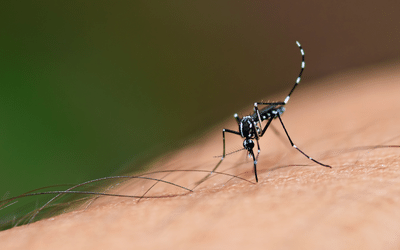
Insect-borne diseases, such as Dengue fever and Chikungunya, are a significant public health concern worldwide, especially in tropical and subtropical regions. These diseases are transmitted by mosquitoes and can cause severe illness, including fever, joint pain, and in some cases, death. To combat these diseases, researchers are continually developing new vaccines to protect against them.
Dengue fever is caused by the dengue virus, which is transmitted by the Aedes mosquito. Dengue is prevalent in many parts of the world, including Southeast Asia, the Western Pacific, Latin America, and the Caribbean. In recent years, there has been a significant increase in the number of reported cases of dengue fever worldwide, with an estimated 390 million infections per year.
Chikungunya is another mosquito-borne disease that has become a significant public health concern in recent years. The virus is also transmitted by the Aedes mosquito and the disease is prevalent in Africa, Asia, and the Indian subcontinent. In recent years, outbreaks of Chikungunya have also been reported in the Caribbean, South America, and Europe.

Aedes mosquitoes bite predominanly during the day time, therefor bite avoidance methods for Dengue fever and Chikungunya should focus on this time of day and include:
Vaccines are also one of the most effective ways to prevent the spread of infectious diseases, and there have been a number of significant developments with vaccine candidates against Dengue fever and Chikungunya in recent years.
Two vaccines have been developed to prevent dengue fever: Dengvaxia (developed by Sanofi Pasteur) and Qdenga (developed by Takeda Pharmaceuticals).

Dengvaxia was approved for use in several countries, including the Philippines, in 2015. However, in 2017, Sanofi Pasteur announced that Dengvaxia could increase the risk of severe dengue in people who had not previously been infected with the virus. This led to a suspension of the vaccine’s use in the Philippines and other countries, and also led to the World Health Organisation’s decision to recommend pre-screening tests before its administration for safety reasons.
In January 2023 Takeda’s dengue vaccine, Qdenga, was granted marketing authorisation in the UK, which is a significant milestone in the fight against dengue fever. Qdenga is a tetravalent dengue vaccine that provides protection against all four serotypes of the dengue virus. The vaccine is designed to stimulate an immune response against the virus, which can prevent the disease from developing or reduce its severity. The vaccine has been tested in clinical trials involving more than 35,000 people in dengue-endemic countries, including Brazil, Colombia, Panama, the Dominican Republic, and the Philippines. The results of these trials have shown that Qdenga is safe and effective in preventing dengue fever.
The UK has one of the most stringent regulatory frameworks for vaccines and this marketing authorisation for Qdenga means that the vaccine can now be prescribed and administered by healthcare professionals here. This is a significant step forward in the global fight against dengue fever, as well as a positive development for the millions of people who travel to dengue-endemic regions each year.
For Chikungunya, several vaccine candidates are in various stages of development, however a vaccine candidate developed by Valneva is currently leading the race.

Valneva, who specialise in vaccines, has completed enrolment for a phase 3 trial of it’s chikungunya vaccine candidate, VLA1553 after the phase 2 trial demonstrated the vaccine’s safety and immunogenicity. The company completed submission of a License Application to the US Food and Drug Administration for approval of VLA1553 in individuals of 18 years and above in December 2022. If approved it could become the first chikungunya vaccine to be marketed in the US.
Licensing and marketing authorisation for vaccines in the UK and Europe is a complex process that involves multiple regulatory agencies. In the UK, the Medicines and Healthcare products Regulatory Agency (MHRA) is responsible for the licensing of vaccines. In Europe, the European Medicines Agency (EMA) is responsible for the authorisation of vaccines.
Before a vaccine can be licensed or authorised, it must undergo rigorous testing to ensure its safety and efficacy. This testing includes preclinical studies, which involve testing the vaccine in animals, and clinical trials, which involve testing the vaccine in humans. Once a vaccine has been shown to be safe and effective in clinical trials, it can be submitted for licensing or authorisation.
Giving you written and video content to answer all your questions on primary care education from Phlebotomy to Travel Health.
Subscribe now to be kept updated with our latest posts and insights.
Start typing to search courses, articles, videos, and more.